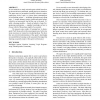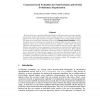1285 search results - page 33 / 257 » Agent Based Processing of Global Evaluation Function |
IAT
2007
IEEE
14 years 2 months ago
2007
IEEE
Emotion regulation describes how a subject can use certain strategies to affect emotion response levels. Usually, models for emotion regulation assume mechanisms based on feedback ...
ICML
1999
IEEE
14 years 8 months ago
1999
IEEE
Excerpted from: Boyan, Justin. Learning Evaluation Functions for Global Optimization. Ph.D. thesis, Carnegie Mellon University, August 1998. (Available as Technical Report CMU-CS-...
ICMLA
2007
13 years 9 months ago
2007
In our research we study rational agents which learn how to choose the best conditional, partial plan in any situation. The agent uses an incomplete symbolic inference engine, emp...
ICML
2000
IEEE
14 years 8 months ago
2000
IEEE
Eligibility traces have been shown to speed reinforcement learning, to make it more robust to hidden states, and to provide a link between Monte Carlo and temporal-difference meth...
ICES
2005
Springer
14 years 1 months ago
2005
Springer
While the fault repair capability of Evolvable Hardware (EH) approaches have been previously demonstrated, further improvements to fault handling capability can be achieved by exp...


